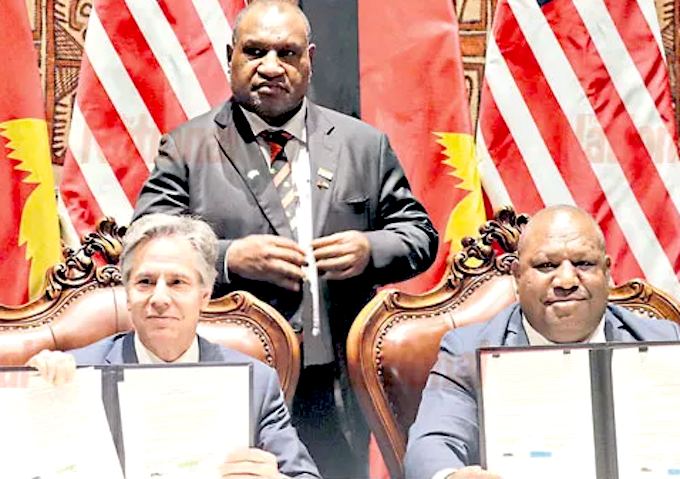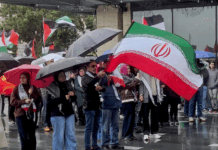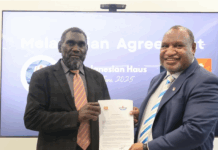
COMMENTARY: A special correspondent in Port Moresby
As an officer of the Department of Foreign Affairs in the Papua New Guinea government, I have to write anonymously to secure my safety.
I am writing to reveal interference by the United States in PNG’s internal affairs which is undermining the bilateral relationship between Australia and PNG.
As China’s influence rises in the Pacific Islands, PNG Prime Minister James Marape is worried that the China-Solomon Islands Security Agreement will lead to the Solomon Islands surpassing PNG’s dominant position in Melanesia.
So the Marape government decided to negotiate separately with the US and Australia on two separate agreements they wished to conclude last May.
The US rapidly resolved negotiations and the PNG-US Defence Cooperation Agreement was officially signed before Australia had even concluded its draft Bilateral Security Treaty.
Marape has defended the US-PNG agreement several times in Parliament, while raising some constitutional concerns on an Australia-PNG treaty during his meeting with Australian Deputy Prime Minister Richard Marles.
PNG has chosen the US to be the first defence partner, although Australia is PNG’s closest neighbour and long-time partner.
Advance draft of treaty
To its advantage, the US had acquired an advance draft of the Bilateral Security Treaty and knew Australia intended to be PNG’s first security partner.
The US discovered that PNG would not cooperate with other countries in the Pacific Islands security area without Australia’s approval.
So the US then made adjustments to the Defence Cooperation Agreement, revising or deleting articles that concerned PNG in order to settle the agreement ahead of its treaty with Australia.
It was planned that the negotiation between Australia and PNG would be finished in April, but the US intervened and asked PNG to pause the talks with Australia and work on its own Defence Cooperation Agreement first.
The US made commitments during the negotiation with PNG to step up its security support and assistance and cover shortfalls in assistance that Australia had not fulfilled.
Marape and his cabinet had arrived at the belief that Australia was not fully committed to assisting PNG develop its defence force.
There was apparently an internal report revealing that Australia’s intent was not to enhance and elevate some areas of security cooperation but to ensure PNG continued to rely on Australia for all its security needs.
Australia’s process paused
In its negotiation, considering that Australia was trying to prevent US dominance in the Pacific Islands region, the US asked PNG not to share the Defence Cooperation Agreement with Australia.
As a result, Australia’s negotiation process with PNG was paused.
The PNG government, frustrated by empty promises, considered the PNG Defence Force would never be developed in cooperation with Australia, so decided instead to work with a more powerful partner.
PNG knows that its own geopolitical position is becoming of increasing importance, but believes Australia has never respected its position. So PNG decided to use this opportunity to reduce its dependence on Australia.
It also seems the US has supported the Marape government in stifling opposition in PNG to assure the Defence Cooperation Agreement can be implemented smoothly.
For example, Morobe Governor Luther Wenge was initially opposed to the agreement but joined Marape’s Pangu Party and supported it after Marape gave K50 million to his electorate development fund.
Wenge later publicly criticised Australia, saying it did not want PNG to develop its own defence force.
Long mutual history
Australia is PNG’s long-term partner and closest neighbour and we have a long mutual history in economic, political and security cooperation.
My colleagues and I believe that Marape should not betray Australia because it has been tempted by the US, which seems to have intervened to dilute or even ruin our bilateral relationship.
Even though Marape explained to Australia that the Defence Cooperation Agreement would not affect the bilateral relationship, there is no doubt that the relationship with the US will have priority.
So Marape has tightened his control over the mainstream media, social media posts have been deleted for no reason and voices opposing the Defence Cooperation Agreement cannot be heard.
We hope some influential media and Australian friends will help us to protect PNG’s national interest and our bilateral relationship with Australia.
This correspondent’s anonymous article was first published by Keith Jackson’s PNG Attitude website and is republished here with permission.













































